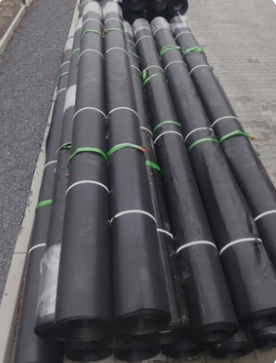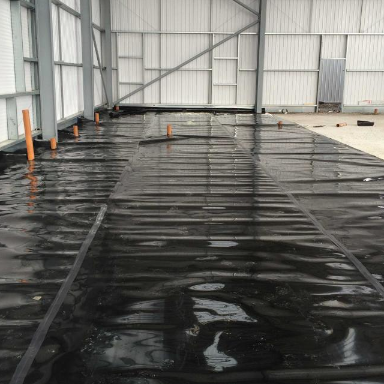- Understanding the Role of Geomembrane Liners in Waste Management
- Innovations in Geomembrane Liners for Water Management
- Geomembrane Liners: A Comprehensive Guide
- The Future of Geomembrane Liners in Civil Engineering
- Geomembrane Liners: Enhancing Landfill Stability
Manager:Alvin Wang
WhatsApp:+62 8983806051
Tel:+86 10-5797-1075
Email:steelwang@okorder.com
Address:3rd Floor, No.2 Building, No.1 Sanlihe Road
Does HDPE geomembrane dissolve in water?
The impermeable barrier properties of high-density polyethylene (HDPE) geomembranes are widely used in civil engineering, environmental protection, and geotechnical applications. However, its relationship with water is always a matter of concern and people often wonder if it can dissolve. In this article we are going to talk about different aspects of hdpe Geomembrane behavior towards water as well as answer the question – does HDPE Geomembrane dissolve in water?

Understanding HDPE Geomembrane
Composition and Characteristics:
HDPE geomembranes are thermoplastic polymers made from units of ethylene monomers. They have excellent strength, flexibility and chemical resistance which makes them suitable for use as landfill liners, pond liners or reservoir covers because they provide an impermeable barrier against liquids or gases migration thus ensuring environmental safety and structural soundness.
Hydrophobic Nature:
HDPE geomembranes have hydrophobic properties meaning that they repel moisture easily without absorbing any amount of it thereby remaining dry even when exposed to wet conditions over long periods. This is due to the fact that these polymers contain non-polar chains which cannot interact with polar molecules such as those found in water. Hence, HDPE remains stable under continuous submersion into water for many years making them perfect choice for jobs that require extended waterproofing ability.
Behavior In Water
Resistance To Dissolution:
One of the remarkable features about HDPE is its resistance against dissolving when mixed with liquid substances like H2O; unlike some materials which might fall apart or decompose on contact with aqueous media including rivers, lakes etcetera but this will not happen since high density polythene does not disintegrate even if placed under water continuously or exposed to aqueous environments. The durability of HDPE in such situations ensures that it functions well throughout its life span within water bodies used for different purposes.
Chemical Inertness:
Mostly, HDPE geomembranes do not react chemically with acids, bases, organic solvents and many other substances dissolved in solutions giving them additional strength against dissolution in water. This feature is attributed to their molecular structure made up mainly of long hydrocarbon chains which are not easily attacked by chemical agents thereby making this type of polymer more stable when subjected to aggressive environmental conditions like those encountered during storage tanks containing corrosive liquids.
Physical Integrity:
Moreover, besides having good chemical resistance properties; high density polyethylenes also possess excellent physical integrity even after prolonged exposure under wet conditions where they retain flexibility along with tensile strength while being dimensionally stable throughout periods required for effective waterproofing within submerged areas. Hence these materials can withstand hydraulic pressures exerted on them by groundwater seeping through or around the structures being protected thus preventing any possible breakthroughs caused by fluctuating levels of water within surrounding regions.
Applications In Water Containment
Landfill Liners:
The most common use of HDPE geomembrane is as a primary barrier system in landfill liners. It prevents leachate from seeping into the groundwater and causing contamination. Furthermore it does not dissolve easily when exposed to various chemicals found in waste products hence ensuring safety of environment as well compliance with regulatory requirements.
Pond Liners:
Another important application involves ponds construction whereby these polymers act as reliable waterproofing membranes which keep off moisture loss together with infiltration. They can be used for both aquaculture ponds and decorative ones since they resist dissolution in water while at same time being hydrophobic thus maintaining high quality standards necessary for healthy ecosystems existence.

Conclusion
In summary, HDPE geomembranes are not soluble in water because they do not like water, are not affected by chemicals and remain as one piece. The fact that it does not dissolve ensures that it works for long when used for storing water such as lining landfills, ponds or covering reservoirs. By using the properties of HDPE geosynthetic liners correctly; waterproofing becomes effective, environmental conservation is achieved while at the same time creating a safe place where different types of liquids can be stored without fear of leakage into surrounding areas which could lead to pollution of natural resources thereby causing harm to living organisms including humans themselves.
- Previous:At what temperature does HDPE geomembrane become brittle?
- Next:What does HDPE geomembrane dissolve in?
-
2024-12-05Geomembrane Liners: A Comprehensive Guide






